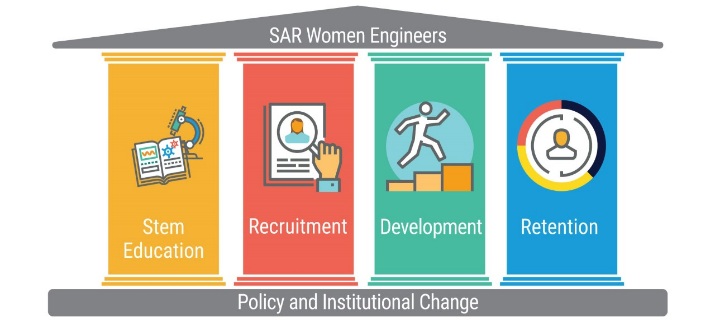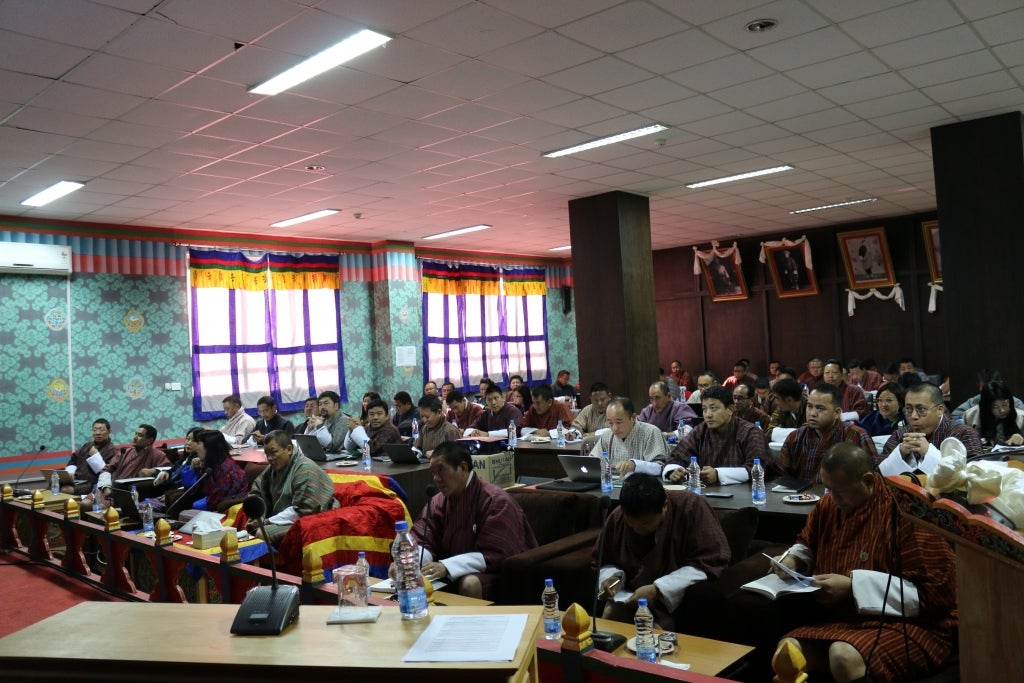 Bhutan Power Corporation's women’s training event, 2019. Photo - Bhutan Power Corporation
Bhutan Power Corporation's women’s training event, 2019. Photo - Bhutan Power Corporation
Small steps by one woman can lead to big institutional changes.
Just ask Kinley Wangmo, a human resources manager with Bhutan Power Corporation (BPC). I met her in early 2019, when Kinley came to a regional conference in neighboring Nepal to find out more about the South Asia Women in Power Sector Professional Network (WePOWER).
WePOWER is a network for women working in South Asia’s power and energy sector. Its goal is to increase opportunities for women and encourage girls to enroll in science, technology, engineering, and math (STEM) education. As a WePOWER partnership coordinator, I see firsthand how a women’s network can empower employees to tackle difficult social issues such as gender equality.
In Kinley’s case, she returned to her office in Thimphu inspired by what she heard at the conference about the gaps and barriers women face in the energy sector. BPC, she realized, ranked ahead of most electric utilities in South Asia with 444 women employees, or 19 percent of the company’s total workforce. Her enthusiasm to raise that percentage in the small Himalayan nation was reinforced by her friends, family, and colleagues.
WePOWER is a network for women working in South Asia’s power and energy sector, with the goal to increase opportunities for women and encourage girls to enroll in STEM education.

Kinley first identified a few practical steps BPC could take to attract and retain women professionals. As an HR manager, she understood the value of training workshops and mentoring, and could help organize them for women employees. Although this would be unprecedented at BPC, Kinley knew she had to speak up. She also knew that state-owned BPC was generally open to new ideas and sensitive to gender discrimination.
The CEO, realizing the importance of WePOWER’s objectives, instantly agreed to join as an institutional partner after discussing the idea with Kinley. Two managers also took a keen interest: Dechen Dema, BPC’s director of strategy and technology services, and Sangay Tenzin, director of human resources. Together, they emphasized to the senior and middle managements about the importance of WePOWER objectives and supported BPC joining as an official partner of WePOWER, which currently has more than 23 strategic/institutional partners.
BPC began developing its own gender activities under WePOWER’s five pillars: STEM education for girls, recruiting women employees, offering professional development to women employees, and adopting policy and institutional changes. The WePOWER program’s quarterly reporting requirement via WePOWER List of Activities format (LoAs) and persistent engagement helped reinforce BPC’s motivation to act.

In the fall of 2019, Kinley held skills development workshops for female engineers at BPC and established a mentorship program for female recruits. Both of these successful initiatives gave BPC managers confidence in the WePOWER program.
In November 2019, Kinley persuaded Sangay and Dechen to participate in the 2nd WePOWER Partnership Forum in Manila. The forum attracted more than one hundred practitioners in South Asia’s energy sector, all committed to increasing job opportunities for women. The South Asia region has a labor force participation rate of only 23.6 percent for women compared to 80 percent for men.
Sangay told forum participants that BPC’s company vision is to be an innovative and efficient utility and to help drive the socio-economic transformation of Bhutan. “It is timely and critical to encourage and motivate more women participation in the field of STEM and in the energy sector,” he said.
At BPC’s own Annual Conference in January 2020, Kinley asked Sangay and Dechen to present the utility’s new WePOWER gender activities. Surprisingly, they not only introduced the BPC’s activities in WePOWER but also mentioned the importance of increasing female labor force participation and STEM education in Bhutan. Employees responded positively and several BPC senior members were especially passionate in their support to increase women in Bhutan’s labor force – “Now, time of the WePOWER!”
The South Asia region has a labor force participation rate of only 23.6 percent for women compared to 80 percent for men.

Kinley didn’t stop there. A friend, Dawa Bhuti, the head of corporate affairs at Druk Green Power Corporation, also joined WePOWER at the same time. They began talking about the value of gender-equality measures with other energy utilities and universities in Bhutan.
Together, Kinley and Dawa launched the Bhutan Chapter of WePOWER with Asian Development Bank, which works with the World Bank to promote WePOWER throughout South Asia. In December 2019, other utilities in Bhutan, the Ministry of Education, Royal universities of Bhutan and technical universities endorsed WePOWER and committed to carry out activities that would create awareness and encourage women to participate in STEM subjects and pursue a career in the energy sector.
As Kinley puts it, “Small things can be done easily with confidence, which paves the road toward change.”
Taking the first step, no matter how small, is the most challenging part of the journey to change institutional norms. Initially, Kinley had to persuade her colleagues to volunteer extra hours after work for gender activities, running activities as in-kind contributions. Now she feels she has BPC’s strong support to enhance the workplace and hire more women, especially in engineering and senior management roles.
The power of a network can help women like Kinley bring about transformative changes in their organizations. I look forward to sharing more success stories about how WePOWER is helping other South Asian women to do the same.
WePOWER is supported by the World Bank’s South Asia Gender and Energy Facility (SAGE) with funding from the South Asia Regional Trade Facilitation Program and Energy Sector Management Assistance Program. Follow WePOWER by subscribing to its quarterly newsletter.


Join the Conversation